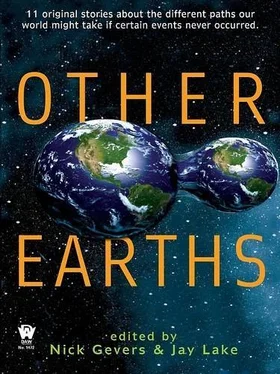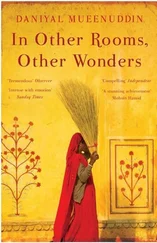Nick Gevers - Other Earths
Здесь есть возможность читать онлайн «Nick Gevers - Other Earths» весь текст электронной книги совершенно бесплатно (целиком полную версию без сокращений). В некоторых случаях можно слушать аудио, скачать через торрент в формате fb2 и присутствует краткое содержание. Жанр: Фантастика и фэнтези, на английском языке. Описание произведения, (предисловие) а так же отзывы посетителей доступны на портале библиотеки ЛибКат.
- Название:Other Earths
- Автор:
- Жанр:
- Год:неизвестен
- ISBN:нет данных
- Рейтинг книги:3 / 5. Голосов: 1
-
Избранное:Добавить в избранное
- Отзывы:
-
Ваша оценка:
- 60
- 1
- 2
- 3
- 4
- 5
Other Earths: краткое содержание, описание и аннотация
Предлагаем к чтению аннотацию, описание, краткое содержание или предисловие (зависит от того, что написал сам автор книги «Other Earths»). Если вы не нашли необходимую информацию о книге — напишите в комментариях, мы постараемся отыскать её.
Other Earths — читать онлайн бесплатно полную книгу (весь текст) целиком
Ниже представлен текст книги, разбитый по страницам. Система сохранения места последней прочитанной страницы, позволяет с удобством читать онлайн бесплатно книгу «Other Earths», без необходимости каждый раз заново искать на чём Вы остановились. Поставьте закладку, и сможете в любой момент перейти на страницу, на которой закончили чтение.
Интервал:
Закладка:
“What is his name?” I asked. “This son of yours.”
“Jordan,” he said.
I had married Maggie not long after I got back from Cuba. I had been trying to set up my photography business at the time. I was far from wealthy, and what resources I had I had put into my business. But there was a vogue among young women of the better type for manly veterans. I was manly enough, I suppose, or at least presentable, and I was authentically a veteran. I met Maggie when she came to my shop to sit for a portrait. I escorted her to dinner. Maggie was fond of me; and I was fond of Maggie, in part because she had no political convictions or fierce unorthodox ideals. She took the world as she found it.
Elsebeth came along a year or so after the wedding. It was a difficult birth. I remember the sound of Maggie’s screams. I remember Elsebeth as a newborn, bloody in a towel, handed to me by the doctor. I wiped the remnant blood and fluid from her tiny body. She had been unspeakably beautiful.
Ephraim wore the key to the barn on a string around his neck. He applied it to the massive lock, still giving me suspicious glances. He kept his rifle in the crook of his arm as he did this. He slid the huge door open. Inside, the barn was dark. The air that wafted out was a degree or two cooler than outside, and it carried a sour tang, as of long-rotten hay or clover.
Ephraim did not call out to his son, and there was no sound inside the abandoned barracks.
Had Ephraim once held his newborn son in his arms, as I had held Elsebeth?
The last of the Liberty Lodges were closed down in 1888. Scandal had swirled around them for years, but no sweeping legal action had been taken. In part this was because the Lodges were not a monolithic enterprise; a hundred independent companies held title to them. In part it was because various state legislatures were afraid of disclosing their own involvement. The Lodges had not proved as profitable as their founders expected; the plans had not anticipated, for instance, all the ancillary costs of keeping human beings confined in what amounted to a jail (guards, walls, fences, discipline, etc.) for life. But the utility of the Lodges was undisputed, and several states had quietly subsidized them. A “full accounting,” as Percy called it, would have tainted every government south of the Mason Dixon Line and not a few above it. Old wounds might have been reopened.
The Ritter Inquiry was called by Congress when the abuses inherent in the Lodge system began to come to light, inch by inch. By that time, though, there had been many other scandals, many other inquests, and the public had grown weary of all such issues. Newspapers, apart from papers like the Tocsin , hardly touched the story. The Inquiry sealed its own evidence, the surviving Lodges were hastily dismantled, and the general population (apart from a handful of aged reformers) paid no significant attention.
“Why dredge up all that ugliness?” Maggie had asked me.
Nobody wants to see those pictures , Elsebeth whispered.
Nobody but a few old scolds.
It was too dark in the immense barracks to be certain, but it seemed to me there was nobody inside but the three of us.
“I came here with Jordan in ’78,” Ephraim said.
“Jordan was twelve years old at the time. I don’t know what happened to his mama. We got separated at the Federal camp on the Kansas border. Jordan and I were housed in different buildings.”
He looked around, his eyes abstracted, and seemed to see more than an old and ruined barracks. Perhaps he could see in the dark—it was dark in here, the only light coming through the fractionally open door. All I could see was a board floor, immaculately swept, picked out in that wedge of sun. All else was shadow.
He found an old crate for Percy to sit on. The crate was the only thing like furniture I could see. There was nothing to suggest a family resided here apart from the neatness, the sealed entrances and windows, the absence of bird dung. I began to feel impatient.
“You said your son was here,” I prompted him.
“Oh, yes, sir. Jordan’s here.”
“Where? I don’t see him.”
Percy shot me an angry look.
“He’s everywhere in here,” the madman said.
Oh, I thought, it’s not Jordan, then, it’s the spirit of Jordan, or some conceit like that. This barn is a shrine the man has been keeping. I had the unpleasant idea that Jordan’s body might be tucked away in one of its shadowed corners, dry and lifeless as an old Egyptian king.
“Or at least,” Ephraim said, “from about eight foot down.”
He found and lit a lantern.
One evening in the midst of our journey through the South I had got drunk and shared with Percy, too ebulliently, my idea that we were really very much alike.
This was in Atlanta, in one of the hotels that provides separate quarters for colored servants traveling with their employers. That was good because it meant Percy could sleep in relative comfort. I had snuck down to his room, which was little more than a cubicle, and I had brought a bottle with me, although Percy refused to share it. He was an abstinent man.
I talked freely about my mother’s fervent abolition-ism and how it had hovered over my childhood like a storm cloud stitched with lightning. I told Percy how we were both the children of idealists, and so forth.
He listened patiently, but at the end, when I had finally run down, or my jaw was too weary to continue, he rummaged through the papers he carried with him and drew out a letter that had been written to him by Mrs. Harriet Beecher Stowe.
Mrs. Stowe is best remembered for her work on behalf of the China Inland Mission, but she came from an abolitionist family. Her father was the first president of the famous Lane Theological Seminary. At one point in her life she had attempted a novel meant to expose the evils of slavery, but she could not find a publisher.
Percy handed me the woman’s letter.
I have received your book “Every Measure Short of War,” the letter began, and it brings back terrible memories and forebodings. I remember all too distinctly what it meant to love my country in those troubled years and to tremble at the coming day of wrath.
“You want me to read this?” I asked drunkenly.
“Just that next part,” Percy said.
Perhaps because of your book, Mr. Camber , Mrs. Stowe wrote, or because of the memories it aroused, I suffered an unbearable dream last night. It was about that war. I mean the war that was so much discussed but that never took place, the war from which both North and South stepped back as from the brink of a terrible abyss.
In my dream that precipice loomed again, and this time there was no Stephen Douglas to call us away with concessions and compromises and his disgusting deference to the Slave Aristocracy. In my dream, the war took place. And it was an awful war, Mr. Camber. It seemed to flow before my eyes in a series of bloody tableaux. A half a million dead. Battlefields too awful to contemplate, North and South. Industries crippled, both the print and the cotton presses silenced, thriving cities reduced to smoldering ruins—all this I saw, or knew, as one sees or knows in dreams.
But that was not the unbearable part of it.
Let me say that I have known death altogether too intimately. I have suffered the loss of children. I love peace just as fervently as I despise injustice. I would not wish grief or heartbreak on any mother of any section of this country, or any other country. And yet—!
And yet, in light of what I have inferred from recent numbers of your newspaper, and from the letters you have written me, and from what old friends and acquaintances have said or written about the camps, the deportations, the Lodges, etc.,—because of all that, a part of me wishes that that war had indeed been fought if only because it might have ended slavery. Ended it cleanly, I mean, with a sane and straightforward liberation, or even a liberation partial and incomplete—a declaration, at least, of the immorality and unacceptability of human bondage—anything but this sickening decline by extinction, this surreptitious (as you so bitterly describe it) “cleansing.”
Читать дальшеИнтервал:
Закладка:
Похожие книги на «Other Earths»
Представляем Вашему вниманию похожие книги на «Other Earths» списком для выбора. Мы отобрали схожую по названию и смыслу литературу в надежде предоставить читателям больше вариантов отыскать новые, интересные, ещё непрочитанные произведения.
Обсуждение, отзывы о книге «Other Earths» и просто собственные мнения читателей. Оставьте ваши комментарии, напишите, что Вы думаете о произведении, его смысле или главных героях. Укажите что конкретно понравилось, а что нет, и почему Вы так считаете.












